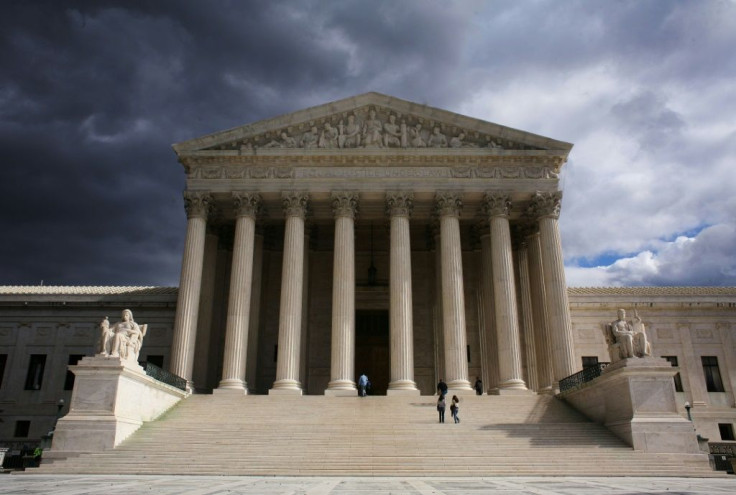Supreme Court Rules Around 3 Million Acres Of Land In Eastern Oklahoma Is Native American Land

KEY POINTS
- The Supreme Court ruled 5-4 in favor of the Muscogee tribe, with Justice Neil Gorsuch siding with the court's liberal justices and penning the court's opinion
- Gorsuch said despite "imprecise language" by state and federal officials, no action has invalidated the boundaries of Muscogee land established in 1866 by the U.S. Congress
- Chief Justice John Roberts said in his dissenting opinion the decision creates "significant uncertainty" about Oklahoma's authority within the disputed lands
The U.S. Supreme Court ruled Thursday around 3 million acres of land in eastern Oklahoma, including parts of Tulsa, is considered Native American land. Justices voted 5-4 in favor of the decision, with Justice Neil Gorsuch voting with the liberal justices and penning the court’s opinion.
The area in question is home to around 1.8 million people though only 15% of the population at most is considered Native American.
“Today we are asked whether the land these treaties promised remains an Indian reservation for purposes of federal criminal law,” Gorsuch said. “Because Congress has not said otherwise, we hold the government to its word.”
Thursday’s decision revolved around the 1997 conviction of Native American Jimcy McGirt. McGirt was convicted in Oklahoma state court in the rape of a 4-year-old girl and was sentenced to 1,000 years, plus life, in prison for the crime. However, McGirt argued Oklahoma authorities overstepped their jurisdiction because the crime took place within the boundaries of the Muscogee Nation’s land.
McGirt filed multiple appeals in Oklahoma courts, which were thrown out, before appealing to the Supreme Court.
Ultimately, Gorsuch and the court’s liberal justices found the land where the crimes took place still fell within land outlined by the U.S. government in 1866 when it established the Muscogee Reservation. Gorsuch said Congress and Oklahoma used “imprecise language” to reduce Muscogee land and authority in the years after the Reservation was established, but these actions did not invalidate the original 1866 treaty.
“The federal government promised the Creek a reservation in perpetuity. Over time, Congress has diminished that reservation. It has sometimes restricted and other times expanded the tribe’s authority. But Congress has never withdrawn the promised reservation. As a result, many of the arguments before us today follow a sadly familiar pattern,” Gorsuch said. “Yes, promises were made, but the price of keeping them has become too great, so now we should just cast a blind eye. We reject that thinking. If Congress wishes to withdraw its promises, it must say so. Unlawful acts, performed long enough and with sufficient vigor, are never enough to amend the law. To hold otherwise would be to elevate the most brazen and longstanding injustices over the law, both rewarding wrong and failing those in the right.”
The decision means going forward, only federal authorities can file charges against Native Americans for crimes committed on the lands in question.
Chief Justice John Roberts, who was among the dissenting votes along with court’s other conservative justices, said the decision now hampers the state’s ability to prosecute serious crimes and could mean other convictions may be thrown out. This was a point presented by Oklahoma Solicitor General Mithun Mansinghani during oral arguments in May, who said ruling the area to be Native American land could force the state to release more than 1,700 inmates.
Other states, including Maine and Texas, also warned in 2019 changing the jurisdictional boundaries of Native American lands “would be confusing and costly at best, and disastrous at worst.”
“What makes this case hard is that there have been hundreds, hundreds of prosecutions, some very heinous offenses of the state law. On your view, they would all become undone,” Justice Ruth Bader Ginsburg said at the time. She was ultimately among the justices who ruled the land to be Muscogee land.
Roberts said the court’s decision has left an air of “significant uncertainty” about state authority within the disputed lands.
“The decision today creates significant uncertainty for the state’s continuing authority over any area that touches Indian affairs, ranging from zoning and taxation to family and environmental law,” Roberts said. “None of this is warranted.”
“What has gone unquestioned for a century remains true today: A huge portion of Oklahoma is not a Creek Indian reservation. Congress disestablished any reservation in a series of statutes leading up to Oklahoma statehood at the turn of the 19th century. The court reaches the opposite conclusion only by disregarding the ‘well-settled’ approach required by our precedents.”
(McGirt v. Oklahoma No. 18-9526)
© Copyright IBTimes 2025. All rights reserved.





















